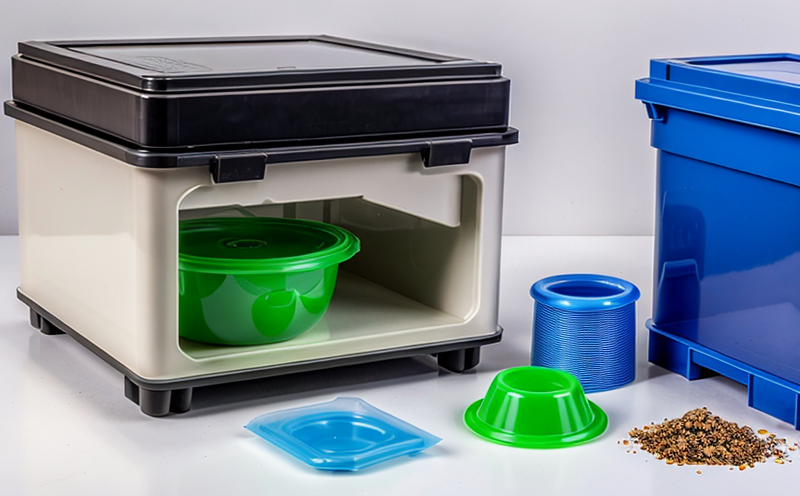ISO 11359 Plastics Thermal Expansion Testing
The ISO 11359 standard provides a robust framework for determining the linear and volumetric thermal expansion properties of plastics. This service is essential in quality control, R&D, and compliance to ensure that materials used in packaging meet stringent dimensional stability requirements under varying temperatures.
Thermal expansion testing measures how much an object expands or contracts over a given temperature range. For plastics, this property can significantly impact the performance of products like containers, closures, and films. Understanding these thermal properties helps prevent issues such as cracking, warping, or loss of structural integrity during manufacturing and use.
The test involves measuring the change in length or volume of a specimen when it is subjected to a controlled temperature cycle. The results are critical for predicting how packaging components will behave under different environmental conditions, which can vary greatly depending on the intended application (e.g., food storage, pharmaceuticals).
Accurate measurement and reporting align with international standards like ISO 11359-2:2017, which specifies methods for determining linear thermal expansion of plastics. Compliance ensures that products meet regulatory requirements and industry expectations.
Our state-of-the-art facilities are equipped to perform these tests in accordance with the latest versions of relevant standards. Our team of experts ensures that every test is conducted under controlled conditions, providing reliable data that can be used for product development, quality assurance, and regulatory compliance.
The importance of thermal expansion testing cannot be overstated, especially in industries where material performance directly impacts customer satisfaction and operational efficiency. By understanding how plastics behave thermally, businesses can make informed decisions about material selection and process optimization.
Our comprehensive approach to ISO 11359 testing includes detailed specimen preparation, precise temperature control, and advanced instrumentation for accurate measurement. The results are presented in clear reports that provide actionable insights into the thermal properties of packaging plastics.
Environmental and Sustainability Contributions
The packaging industry plays a crucial role in reducing environmental impact through sustainable design and manufacturing practices. ISO 11359 testing supports this effort by providing data that helps manufacturers choose materials with superior dimensional stability, reducing waste and improving the overall sustainability of their products.
By ensuring that packaging components do not deform or fail under typical temperature variations, these tests contribute to longer product lifecycles and reduced environmental footprint. This aligns with broader industry goals aimed at minimizing resource consumption and promoting circular economy principles.
The test results also assist in the development of new materials that offer enhanced performance while being more environmentally friendly. For instance, understanding how a plastic film behaves thermally can guide the creation of films with better barrier properties or improved recyclability without sacrificing functionality.
Manufacturers who invest in thorough testing and quality assurance demonstrate their commitment to sustainability and responsible business practices. This not only enhances brand reputation but also fosters trust among consumers and regulatory bodies alike.
Competitive Advantage and Market Impact
Understanding the thermal expansion properties of plastics is vital for maintaining competitive edge in today's global market. Companies that excel at this aspect are better positioned to deliver consistent product quality, thereby enhancing customer satisfaction and loyalty.
With accurate data provided by ISO 11359 testing, businesses can optimize their production processes, select the most appropriate materials, and ensure compliance with local regulations. This leads to more efficient operations and lower costs associated with rework or scrap due to dimensional instability.
The ability to predict how packaging components will behave under various temperature conditions also allows companies to innovate faster and bring products to market sooner. Early identification of potential issues through rigorous testing ensures that products meet both technical specifications and customer expectations.
Moreover, compliance with international standards like ISO 11359 enhances a company's reputation within the industry, making it more attractive to partners, investors, and customers alike. It positions the organization as a leader in quality assurance and sustainable practices, which is increasingly important for long-term success.
Use Cases and Application Examples
| Application Case | Description |
|---|---|
| Film Manufacturing | Determining the optimal heat treatment for plastic films to ensure they remain dimensionally stable during packaging operations. |
| Closure Design | Evaluating the impact of temperature variations on the fit and performance of container closures, ensuring proper sealing capabilities. |
| Container Rigidity | Assessing how changes in temperature affect the rigidity of containers to prevent deformation during shipping or storage. |
| Recycling Programs | Understanding thermal properties helps in designing packaging that can be more easily recycled, reducing waste and promoting sustainability. |
| Application Case | Description |
|---|---|
| Film Stretchability | Evaluating the stretch properties of plastic films to ensure they can be effectively used in stretching and sealing applications. |
| Container Durability | Investigating how different temperature ranges influence container durability, helping manufacturers design longer-lasting products. |
| Material Selection | Selecting the most suitable plastic materials for specific packaging needs based on their thermal expansion characteristics. |
| Product Development | Using test results to refine product designs and improve overall performance, ensuring that packaging meets all necessary requirements. |





